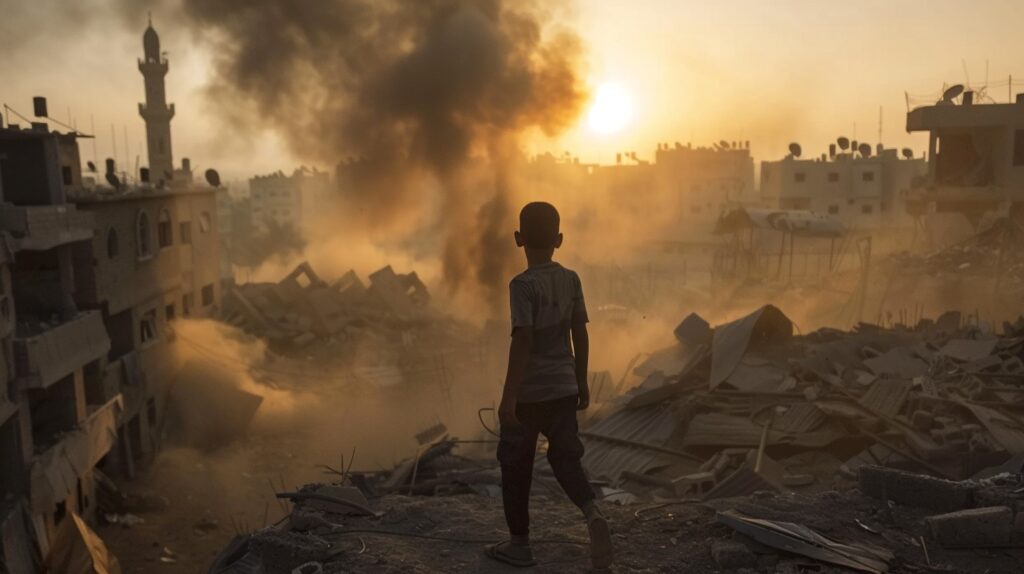Gaza’s GDP Plummets Over 80% Amid Escalating Middle East Crisis

In a concerning development highlighting the growing economic difficulties in the Middle East, the Palestinian Central Bureau of Statistics has reported a significant drop in Gaza’s Gross Domestic Product (GDP), with a decrease of more than 80% for the fiscal year 2024. With ongoing conflict and increasing tensions, this sharp decline underscores the intense economic pressures facing Gaza, indicating possible impacts on regional stability and international peace efforts. The crisis, stemming from deep-seated geopolitical conflicts, has reached a pivotal point, calling for urgent global attention and intervention.
The Economic Descent

Gaza’s economic situation, already impacted by blockades and repeated conflicts, has worsened significantly. The reported decrease in GDP by over 80% is a clear sign of the conflict’s dire effects on the local economy, severely affecting millions of businesses, healthcare, education, and well-being. This decline reflects a worsening humanitarian crisis that risks undoing decades of progress in development.
The economic downfall in Gaza has implications beyond its immediate area, posing challenges to neighboring economies and the wider Middle East region. Disruptions in trade, fluctuations in oil markets, and impacts on agriculture represent just a few of the issues arising. This economic distress could lead to increased regional inequalities, more migration, and greater global economic uncertainty, emphasizing the interconnected nature of worldwide economies.
Furthermore, the economic hardship in Gaza might lead to more conflict, potentially causing broader unrest in the region. The desperation from economic downfall often provides fertile conditions for extremism, which could involve neighboring nations and foreign powers in a more extensive conflict. This situation highlights the critical need for a lasting and inclusive solution that tackles the economic crisis’s underlying causes alongside efforts to resolve the conflict.
Voices from the Ground
The statistics from Gaza reveal many personal stories of hardship and resilience. Interviews with residents, ranging from business owners trying to keep their operations running to families grappling with daily survival, illustrate the significant human toll of the economic downturn. These accounts highlight the severe effect of the crisis on Gaza’s social fabric, where striving for a semblance of normal life amidst turmoil is an everyday battle.
An anonymous industry expert proposes an alternative view, suggesting that the severe crisis could be an opening for significant economic reform and innovation. This perspective argues that the collapse might lead to reconsidering economic models and international aid approaches in Gaza, possibly setting the stage for more enduring development and peace in the region. This viewpoint contrasts the widespread despair with a recommendation for strategic, future-focused planning.
The appeals from Gaza share a unified request for the international community to deliver immediate humanitarian assistance and to undertake a more profound and ongoing effort to tackle the root causes. The international reaction to the crisis, from global organizations to sovereign states, faces scrutiny over its efficacy and enduring value, underscoring the necessity for a unified and far-reaching plan beyond short-term aid.

Looking Ahead

The path forward for Gaza and the broader Middle East presents significant challenges and opportunities for change. The international community’s support in fostering diplomatic dialogues, advancing economic reforms, and promoting sustainable development is key to progress. Transitioning from providing immediate humanitarian aid to rebuilding Gaza’s economy and infrastructure with an emphasis on resilience and self-sufficiency is crucial.
The pressing need for peace and stability in the Middle East, underscored by Gaza’s economic struggles, calls for a comprehensive strategy. This strategy should address immediate humanitarian needs and the complex political, economic, and social factors fueling the conflict. The international community’s actions in the near future will significantly influence the region’s trajectory.
As the situation in Gaza and the broader Middle East evolves, the international community finds itself at a critical point. It guides the region away from ongoing conflict and toward lasting peace. Gaza’s circumstances require a strategy that mitigates immediate suffering and establishes a basis for long-term stability. Key to this strategy is prioritizing investments in education, healthcare, and economic diversification and facilitating political dialogue. This aims to resolve current issues and prevent future conflicts, demanding a collective effort from global stakeholders to become active partners in fostering a Middle East characterized by inclusiveness, prosperity, and peace.
Final Remarks from the Expert

Reflecting on the crisis, the industry expert emphasizes recognizing Gaza’s economic collapse as a critical signal for the international community. “This crisis should prompt a renewed global dedication to peace and development in the Middle East,” the expert notes. “Solving the conflict’s underlying issues and creating a foundation for a stable and prosperous future for everyone requires collaborative effort and creative solutions.”



